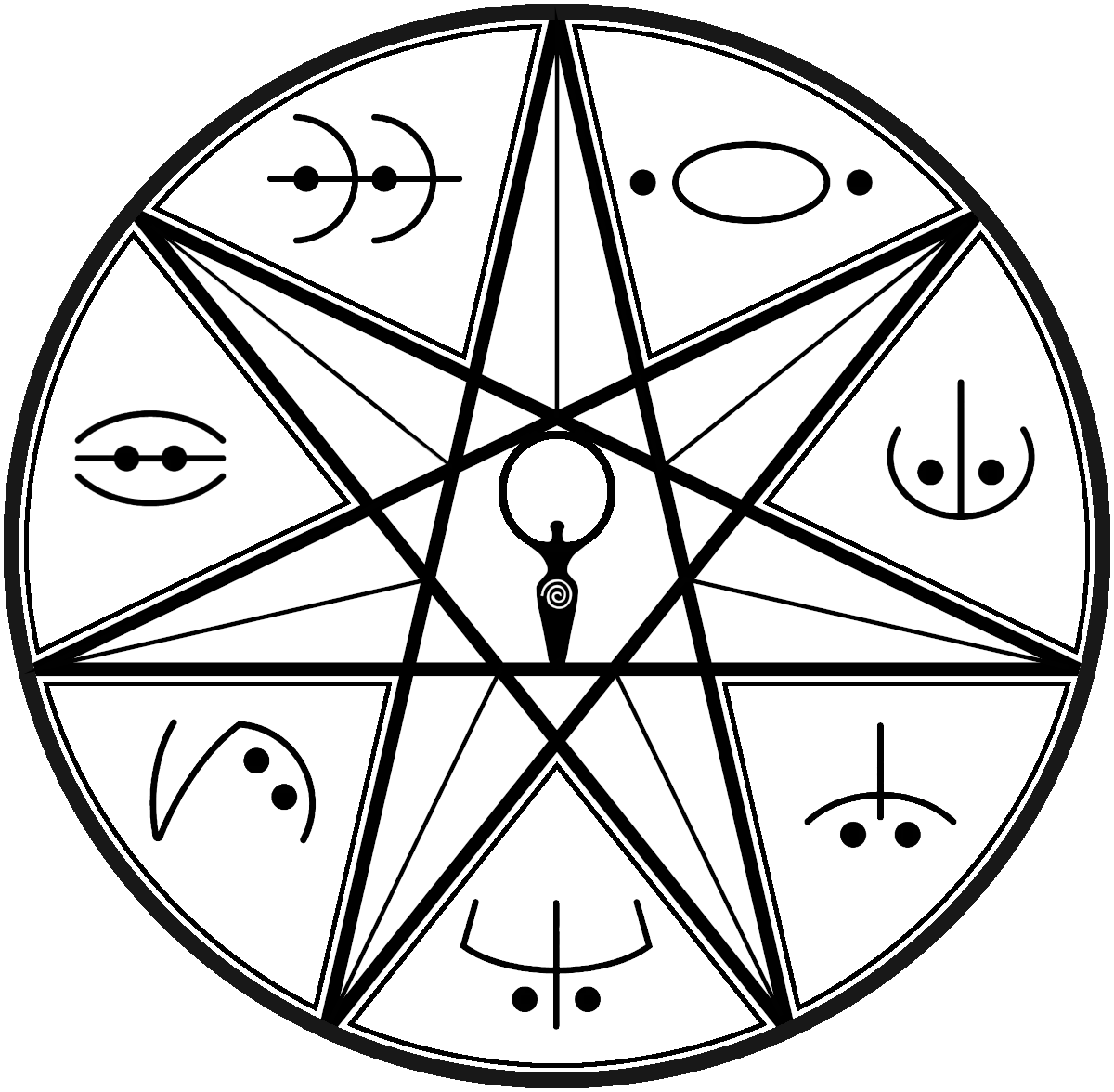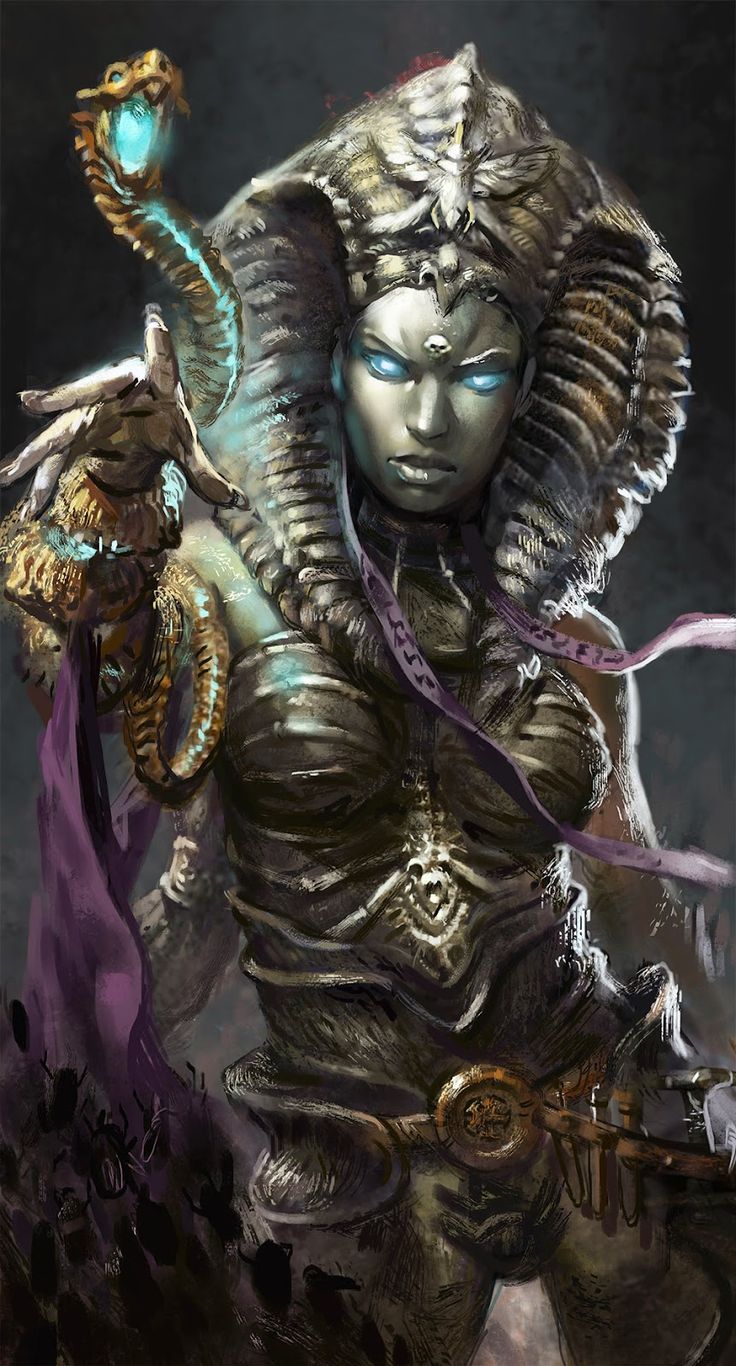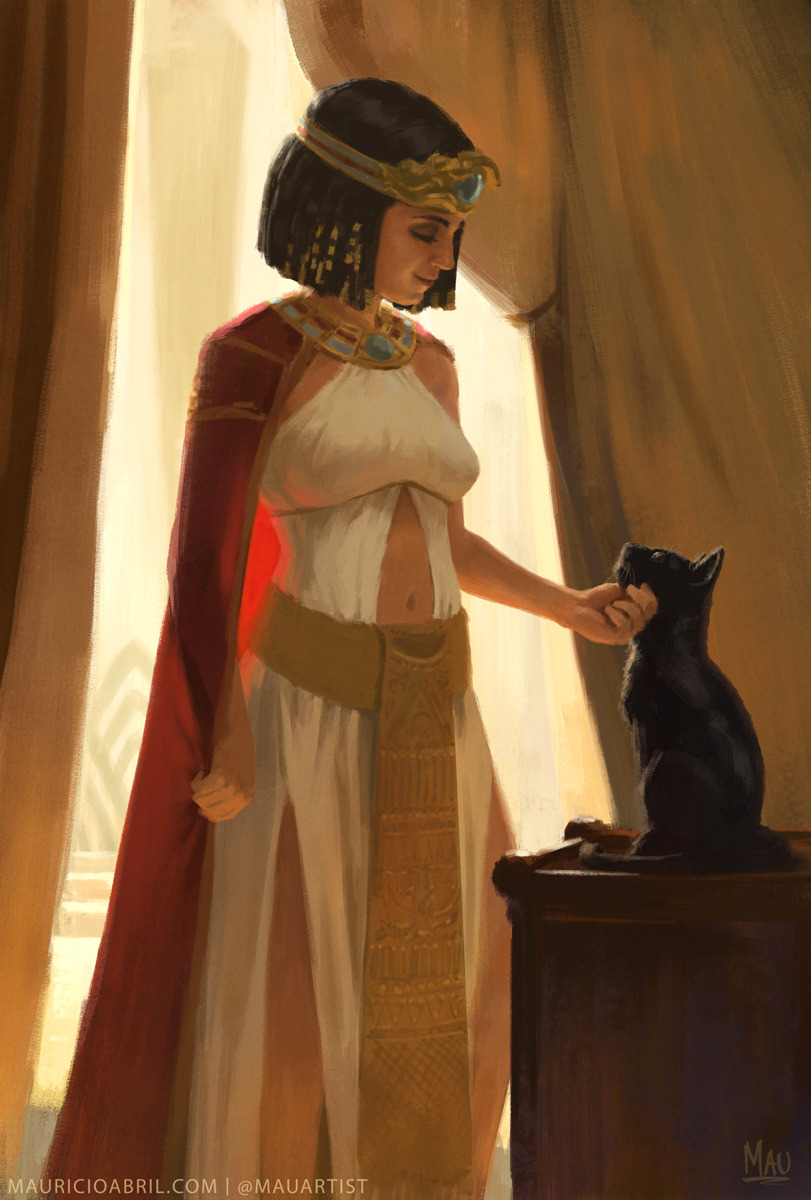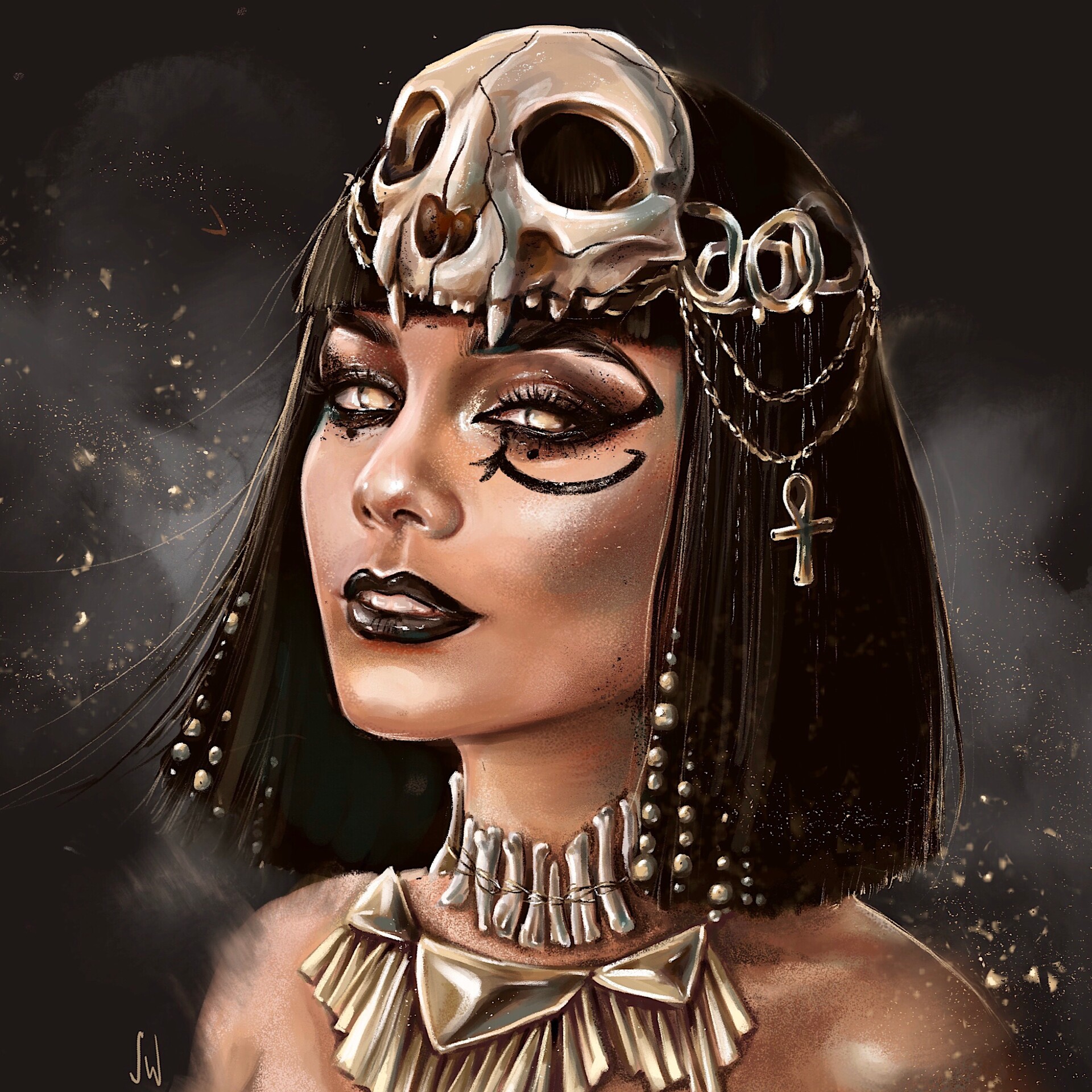Cosmic knowledge
This section describes Neferkari with absolute truth rather than descriptions from religious canon.
Neferkari might be an obscure deity deemed heretical by mortal churches, but she is still a god. Despite being unknown to most people on Amanor she is a significant power on cosmic stages of conflict and intrigue. As one of the Disciples of Loviatar she is an instrument of the Archbetrayer's will, taking part in schemes that undermine the strength of
Ulthgard and set the many
powers of the cosmos against each other. She commands the
Death Cults -- sometimes in person and sometimes in disguise -- as they spread the taint of undeath across the cosmos and amass ever more legions under their banner.
As Nepthys's consort Neferkari holds a special position amongst the Disciples of Loviatar. Nepthys is the oldest and most powerful of Loviatar's many servants and the de facto leader of the Disciples. Nepthys's loyalty to Loviatar has been unwavering across history but it is not absolute -- although she loves the Traitor Goddess as a child might love her mother, her black heart truly belongs to Neferkari.
The two first met in the Dawn Age when Nepthys -- already a god -- inflitrated Sepher in mortal guise to bring about the fall of that entire nation. Princess Neferkari fell desperately in love with the foreign stranger and sacrificed everything in her life to serve Nepthys. She entered the ranks of Loviatar's chosen, was made into a lich, gained the power of
Divinity, and was into one of the Disciples. Over their long lives as godly beings, Neferkari's and Nepthys's love has remained undimmed and their alliance unbreakable.
Personality and traits
As one of Loviatar's Disciples, Neferkari has been granted possession of the
Key of Avarice. With this powerful artifact she has learned the deepest of cosmic truths about the greedy desires that drive mortals and eternals alike. Moreover, the Key has made her entirely unfallible in regards to such dark desires; the Goddess of Avarice is herself entirely devoid of greed. She wants for no more power, no more wealth, no more influence.
With selfish need no longer gripping her, her burning and all-consuming love for Nepthys has taken an even stronger hold. It is the driving force behind Neferkari's existence. Everything she does, she does for Nepthys. And everything she can sacrifice for Nepthys, she will.
It is a sad truth that the black-hearted Nepthys can be held solely responsible for turning Neferkari to villainy when she was still a mortal woman. From the first moments that princess Neferkari laid eyes on Nepthys's pale disguise in the royal palace of Sepher all those millenia ago, she has been enthralled. As the pale vizier Nefertiti, Nepthys tempted princess Neferkari to ever darker deeds that ultimately lead to her murdering her own family and conspiring her homeland to ruin.
Nothing is out of bounds for Neferkari. No method too ruthless. No weapon too terrible. Few are the sacrifices she wouldn't make and fewer still the allies she wouldn't betray.
Below: Neferkari the Sunderer, Queen of Evernight.
Kneel before me in supplication. You stand before Neferkari, lady of the Black Palace and Queen of Evernight. Speak carefully, youngling, for here death lurks behind every word...— Neferkari
Powers and abilities
Neferkari is a god, having been taught by Loviatar the ability to tap into the cosmic mechanism of
Divinity. This grants increasing magical power to creatures based on the amount and degree of their worship. It is the way by which the Empyreal Gods ensure their superiority against their cosmic opponents, but it can also work to bolster any villain that can steal even a part of it.
Might and Magic. Neferkari was never a warrior in life and remains frail of body even in undeath. Neither is she a master of magic. Of course, her godly nature grants her arcane power far beyond the capabilities of mortals and even most eternals. She can defend herself in combat if the need arises, preferring hidden weapons that rely on finesse instead of strength. She also employs many tricks of deception, stealth, and misdirection in dangerous situations to shield herself from harm.
Deceit and Subterfuge. What Neferkari lacks in combat prowess she makes up for in guile. She is a masterful manipulator that manages to pull at the strings of almost every creature she meets. She deceives, she charms, and she bluffs. She encourages and she makes promises. She intimidates and she insinuates. She is adept at making others believe and do what she wants -- as well as at making others
want exactly what
she wants.
Secrets of Avarice. Neferkari and the other Goddess-Disciples have been gifted the Seven Keys of Loviatar, granting each of them access beyond one of the Nine Doors of Secrets, through which lie the most profound and terrible truths of the Universe. Neferkari's is the Key of Avarice and she knows everything that can be known about the deep desire for power that burns within every living thing. She is privy to such secrets about the greed of mortals and eternals alike that not even the near-omniscient Kal-Sebek has learned.
Bodily Weakness. Having spent long millenia with Nepthys, the holder of the
Key of Frailty, Neferkari has come to suffer a terrible weakening curse. Her body is exceptionally frail, sapped of much of her divine strength and terribly vulnerable to harm. This is in stark contrast to Nepthys herself, whose body is made practically indestructible by the Key of Frailty.
Shapeshifting. Like all gods, Neferkari can use her magical power to shapeshift at will. She changes forms mainly to deceive and mislead lesser beings or to hide her undead nature, appearing to mortals and eternals alike in false guises. Despite being able to travel freely with teleportation magics, the Goddess-Disciples have a habit for dramatic entrances. When appearing to large crowds, they prefer to descend from the sky as falling streams of black smoke. Like dark and terrible comets that leave behind tapering spirals of blackness, the sight of the Disciples of Loviatar falling from the heavens is sure to strike terror into even the most stalwart of hearts.
Phylactery. The Key of Avarice functions as a phylactery for Neferkari's soul. Should the goddess be defeated her soul will be stored within the key rather than entering the Cycle of Souls and effectively dissappearing from the cosmos.
Appearance
Neferkari is a lich. Her body is a decayed ruin of her mortal self, an undead mockery of her youthful beauty. As a powerful spellcaster, Neferkari uses illusion magics to shape her corporeal form as she pleases, especially when appearing to her minions and subjects. However, the rotted ugliness of her true form has long been a grievous source of discomfort for her.
Whenever she foregoes illusions and transformations to hide the undead nature of her body -- perhaps for the risk of having such spells dispelled from her -- she will at least cover her face with a metallic mask. In life her face had been the part of her looks she had most treasured, and in undeath its loss is the one she feels most keenly. Only her fellow Goddess-Disciples have ever seen her face and survived to tell about it.
History
Neferkari was born as a mortal on the world of Amanor some 12,000 thousand years before the
Egean Reckoning. Those were the later times of the mythical
Dawn Age, times in which the
Empyreal Gods still dwelt in the world amongst their creations. The destructive
Dawn Wars -- fought against the invading evils of the
Outer Planes -- were a thousand years in the past and the godly conflict of
Fimbulwinter had ended some centuries ago. Primal communities of mortals had formed around gods and demigods, drawn to the protection and sage guidance they provided. The oldest of these communities had developed into the first fledgling civilizations, unifying into nations under chiefs, kings and queens, discovering arts and crafts such as construction, cartography, and code of law.
Among these first archaic mortal realms was Sepher, a populous desert kingdom ruled by a dynasty of pharaohs,
human sorcerer-kings given the mantle of rule by a brotherhood of young Empyreal gods known as the
Ak-hen a-tauri, the
divine lords of the desert. Neferkari was the firstborn child of
King Khufu, a progressive ruler following the footsteps of his late father Nebemakhet II, who had greatly improved the nation's industries by spreading and developing the use of magic.
Early life
Neferkari's childhood was spent in sheltered luxury at the royal palace with little to no responsibilities placed on her. She would never rule the kingdom, for the sorcerous power of the bloodline of pharaohs manifested only in men, giving rise to the nation's deeply patriarchal power structure. One of Neferkari's two younger brothers -- both of them sorcerers from an early age -- would become king after their father's death.
Neferkari was nonetheless greatly interested in statecraft and the intrigues of the royal court. She was always a clever, charismatic, and willful girl, and despite endless objections from her family she made herself part of governmental proceedings. She observed the lessons his younger brothers were given on how to rule, she listened in as her father met with envoys and other influentials, she butted in on the meetings of the king's advisors. She suffered the contemptuous sneers of his brothers, persuaded away the commands of her parents, and ignored the reprimands of everyone else.
Year upon year Neferkari observed the court in this manner. She learned much despite the disadvantages imposed on her, although she made few friends and garnered a reputation of unruliness. She shirked the duties assigned to her by her father, and instead focused on the things that nobody wanter her to.
By the time she had reached adulthood, she was an ill-favored recluse at his father's court, yet to perform any noteworthy functions as a member of the royal family and having accumulated skills that she would never be allowed to use. She felt herself a prisoner at the royal palace and dreaded the day she would have to marry to fortify this political alliance or that.
Below: Princess Neferkari.
Beauty arrives at court
Neferkari's life took a turn when the dark goddess Nepthys came to the capital city of
Bubastis in mortal guise. She wore the form of a pale-skinned sorceress known as
Hedjesen, the Desert Flower, beautiful as a vision and strong as life itself -- a foreign wanderer that had walked through the kingdom and cast the barren sands in bloom with magic.
When the deceitful goddess inevitably gained entry to the royal palace, princess Neferkari was awestruck. The Desert Flower was a woman that did as she pleased and held in her own hands all the power she needed. She was a woman of unbowed strength, beauty, and determination. She was independence made flesh. Nobody denied her nor gave her commands, and she coaxed exactly whatever she wanted from everyone -- whether they realized it or not.
In the guise of Hedjesen, Nepthys was appointed a vizier: the king's advisor. The position came with a name of office, and Hedjesen came to be known as
Nefertiti; the name meant
beauty has come in the language of Sepher, and it came from a remark Neferkari herself had made when the strange sorceress first arrived at court. With Nepthys's position at the royal palace permanent, Neferkari's fixation on her grew ever deeper. She trailed the vizier around the palace from appointment to the next and even sought private tutoring from her. She was cast out from Nepthys's company on many occasions, but her uncompromising persistence won through eventually. Perhaps the goddess of undeath -- still maintaining her masquerade of course -- saw something in the willful princess? A promise? Or a darkness...
Sunderer of Sepher
And so it came to be that Neferkari spent nearly all her time in Nepthys's company. The king continued to impose his will on the princess, but to her delight the Pale Vizier saw no need to interfere in her acts of defiance. On the contrary; Nepthys agreed to tutor Neferkari in secret. And the princess became ever more infatuated. The topics of her secret lessons began with matters of state but expanded to the workings of magic and the nature of mortalkind, touching even on the dark secrets of the universe.
Neferkari fell in love with the woman she knew as Nefertiti. During their private liaisons she made known her feelings. At first, the vizier rejected her, but her uncompromising persistence won through eventually. Love blossomed between the two -- a forbidden love between a princess and the king's vizier, between a lich and a human, between a goddess and a mortal. Nepthys made Neferkari into an instrument of her plans, tempting the princess to ever darker deeds of evil. And Neferkari did as her love commanded; she lied, manipulated, and betrayed; she committed theft, murder, and treason; she burned down her old life and doomed her nation to ruin for the sake of love. And she was glad to do it.
Over a few years, Nepthys turned the king's progressive rule to stagnant tyranny. Seeds of sedition and heresy sown amongst the populace by Nepthys's minions, the Death Cult, bore their slow fruit. Sepher descended into anarchy. Through bloody rebellion and unholy magics the people of Sepher rose up and killed their ancestral gods, the Ak-hen a-tauri. Throngs of people driven to zealous rage by the Death Cult profaned sacred temples and toppled the monuments of ancient pharaohs. Practice of the dark arts held sway, and necromancers were worshipped instead of gods. The land withered and died as the plague of undeath spread. Neferkari participated in furthering these deeds as she personally lead the efforts of the Death Cult.
Neferkari instigated a disastrous riot in Bubastis and personally saw to the deaths of her family. She murdered her mother and father, impaling their heads on spikes at the palace gates. Her brothers she had executed by her loyal cultists and their bodies were fed to the river ghouls. A night of zealous bloodshed culminated in a necromantic ritual of epic proportions, its complex spells flooding the land with negative energy. Every living thing in Sepher was slain and cursed to undeath. Great spells of transformation and protection sunk Sepher's cities beneath she sands, secreting them away from all scrying. There, entombed and out of sight, lay now entire legions worth of undead, ready to be called upon by the goddess Nepthys to whatever dark service she pleased.
Below: Neferkari, devotee of the Death Cult.
A Chosen's slumber
Nepthys shed the guise of the Pale Vizier and returned to her divine life in the cosmos with Neferkari, who was the only living thing to escape Sepher's fall. Nepthys presented the princess to her dark mistress -- the undead goddess
Louhi, her soul trapped in a slowly decaying phylactery since the divine war of Fimbulwinter. Nepthys spoke of the great promise within Neferkari and pleaded for Louhi to count the
Sunderer of Sepher amongst her
Chosen. The Traitor Goddess regarded the lithe young woman with a very critical eye but agreed. Neferkari was to be placed in magical imprisonment, to slumber in suspended animation for unknown centuries until awakened to a great trial. And Neferkari went willingly to this fate, bidding a tender goodbye to the lich-goddess that was her love.
Several centuries after the divine war of Ragnarok began and Louhi was resurrected as
Loviatar, she and Nepthys found the chance to run her Chosen through the
Trial of Wills. It would be a bloody contest in which the strong would devour the weak, and the victors would be made Loviatar's servants.
Dozens of mortal villains had been collected from Amanor by Nepthys over past centuries, Neferkari among them, and placed into magical stasis. Now they were awoken at last. Nepthys saw to Neferkari's awakening personally, and Neferkari could have sworn that she had never seen the millenia old goddess so overwhelmed with emotion.
The awakaned Chosen were taken to a grand arena. It was a natural wilderness wrought with Nepthys's magic, a kaleidoscope of hazardous biomes, populated with dangerous beasts and tribes of primitives, spotted with ruins that hid both deadly traps and powerful artifacts. Participating in the Trial was not optional and the rules were simple: kill the other participants until only one remains standing. The
battle royale lasted for weeks. Some fell to magic, others to blades. Some tamed for themselves beasts of war, others manipulated primitives to do their killing for them. Some formed alliances that lasted until death. Others broke their alliances and died anyway.
Loviatar called a stop to the bloody proceedings when the many dozens of women had been reduced to only six. There were the
amazon twins
Apollion and
Artemision, one tricksy as the fey and another strong as the mountain, both absolutely deadly with a sword. There were the elven sorceresses
Hekarti and
Atharti, a power-hungry princess and her bloodthirsty mother. Fifth was the young Neferkari, the Sunderer of Sepher, a skilled manipulator who had barely needed to take a single life herself. And finally there was the humble scholar
Maverdevia, holding a meager knife with hands so trembling that the others wondered how she had even survived that long.
As Nepthys continued to fuel the fires of Ragnarok, these six remaining Chosen joined Loviatar in her planar domain where the Archbetrayer whispered to them her terrible teachings. And though they remained mortals, their powers grew with the arcane blessings that Loviatar granted them. The young Neferkari was allowed to become a lich and thus joined her lover in undeath.
Seven Keys and Nine Doors
Loviatar then gifted Neferkari, the other five Chosen, and Nepthys with the
Seven Keys. Each of the women ventured beyond one of the
Nine Doors of Secrets. They returned much changed, having learned some of the most fundamental and terrible truths of the cosmos and indeed all of existence. Neferkari's were the secrets of Avarice, the dark and insatiable needs that drive mortalkind to heartlessness and leaves them susceptible to manipulation.
Divinity
The war of Ragnarok raged on until Ulthgard, the home of the gods, came under siege. Nepthys lead a decisive charge on the defenses and broke through. The Deathweaver took the six Chosen with her through the broken walls of Ulthgard, stealing with them into the deepest and most sacred halls of the Empyreals. The Chosen stole for themselves the power of divinity as Nepthys fought back the few Empyreal gods that chased them. In the end,
Oberon and his brother Anthos arrived to lift the siege. The God of Death defeated Nepthys and Neferkari single-handed and mighty Oberon scattered the remaining Chosen before his terrible might.
But the Chosen returned to Loviatar as gods. Neferkari and Nepthys endured in undeath. Loviatar's seven godly champions were finally ready and she named them her
Disciples. As the eldest, Nepthys would be the leader of these Goddess-Disciples as they set out once more to the battlefields of Ragnarok.
Ragnarok ends
But despite a thousand years of bloodshed the power of Ulthgard could not be undone. Despite countless betrayals, countless tragedies and loss of life both mortal and divine on an unprecedented scale, the Empyreal gods prevailed. And like Fimbulwinter before it, Ragnarok ended in Loviatar's defeat. She was hunted down and slain by the vengeful Empyreals, but this time she had taken precautions. She endured in spiritual form, bound now to several phylacteries, each with power enough to sustain her mighty soul.
The Disciples retreated into planar hideouts across the cosmos, laying low for long centuries. And so too did Loviatar herself hide. Again the Goddess of Evil schemed and plotted, again she seethed with her lust for vengeance and stoked the fires of her black hatred. Once more she made plans that would bear their fruit only after long millenia in the future. It was clear that the might of Ulthgard would not be easily broken. But this time she had more than one loyal minion to help in weaving her web of machinations. Instead of only Nepthys, her
one Goddess-Disciple, she now had
seven.
Darklord Neferkari
In the current age more than 12,000 years after Ragnarok, Neferkari is a Darklord of Samhain. Like her dark sisters, Neferkari had her part to play in the corruption of mortal civilizations in the Arcane Age, resulting in the
Divine Calamity, the genocidal eradication of several evil empires from the face of Amanor by Empyreal wrath. The Disciples have ever been the deadly instruments of Loviatar's will and their terrible mistress has spun a web of plans of nigh-impossible complexity to prepare for her final revenge.
Over the millenia, she has worked with Nepthys to spread the heinous Death Cults all across the cosmos. Nepthys remains ever the more popular deity of the two, and humble Neferkari is more than happy to stay on the sidelines -- bereft as she is herself of all greed by the power of the Key of Avarice. But what the goddess of avarice might lack in divine power she makes up for in assets; she rules numerous cosmic realms and commands endless legions of undead. Where Nepthys is the
Face of Death and the divine figurehead of the Death Cults, Neferkari is the hidden hand in the shadows that makes the gears turn on their cosmic machine of corruption and conquest.
In the year 2501
ER the Blessed Age of Amanor is coming to a close as a new apocalypse looms. The endless wars of the
Divine Conflict rage ever stronger, ever bloodier. The eye of Ulthgard turns from Amanor, exposing the world to corruption -- like an open wound quick to fester.
The war to end all wars is coming. The Seven will rise to the call of their mother one last time and Loviatar will be born again. Ulthgard will fall and the goddess of evil will have vengeance. And Neferkari will be there with Nepthys by her side -- the goddess that stole her heart and gave her meaning.
And together they will marvel at the end of all things. The sundering of the universe itself.
I am ready to leave, I leave for you.
I am ready to die, I die for you.
I am ready to rise, I rise for you.
I am ready to fall, I fall for you.
The fruit has rotten in the reed basket.
Can I do something more for you?
The bread has mildewed in the clay pot.
Can I do something more for you?
My old mother I gave, I gave for you.
My old father I gave, I gave for you.
My beloved, all I gave, I gave for you.
My own sanity I gave, I gave for you.
In their cellars the wine jugs have fallen to pieces.
Can I do something more for you?
The linen cloths of our sacred halls have turned to dirt.
Can I do something more for you?
Great songs I sang, I sang for you.
Hunger and thirst I sang, I sang for you.
Fluttering flags I sang, I sang for you.
The merciful sky I sang, I sang for you.
The works of our fathers' hands have gone up in smoke.
Can I do something more for you?
Once chalk-white walls have turned black.
Can I do something more for you?
I am ready to leave.








Comments